Energy transferred from one trophic level to another is
100%
5%
10%
50%
The correct Answer is:C
Step by step video, text & image solution for Energy transferred from one trophic level to another is by Biology experts to help you in doubts & scoring excellent marks in Class 12 exams.
Topper's Solved these Questions
- BOOK - MODERN PUBLICATIONCHAPTER - ECOSYSTEM EXERCISE - COMPETITION FILE (OBJECTIVE TYPE QUESTIONS)(B. MATCHING TYPE QUESTIONS: )6videos
ECOSYSTEM
- BOOK - MODERN PUBLICATIONCHAPTER - ECOSYSTEM EXERCISE - COMPETITION FILE (OBJECTIVE TYPE QUESTIONS)(C. ASSERTION - REASON TYPE QUESTIONS: )14videos
ECOSYSTEM
- BOOK - MODERN PUBLICATIONCHAPTER - ECOSYSTEM EXERCISE - REVISION EXERCISES (VI. LONG ANSWER TYPE QUESTIONS)(B. QUESTIONS FROM CBSE EXAMINATIONS)12videos
ECOSYSTEM
- BOOK - MODERN PUBLICATIONCHAPTER - BIOTECHNOLOGY AND ITS APPLICATIONSEXERCISE - CHAPTER PRACTICE TEST (SECTION - E)2videos
BIOTECHNOLOGY AND ITS APPLICATIONS
- BOOK - MODERN PUBLICATIONCHAPTER - EVOLUTIONEXERCISE - CHAPTER PRACTICE TEST (SECTION-D)(CASE-BASED SHORT ANWER )(THREE MARK EACH)2videos
EVOLUTION
Similar Questions
Food chains and the energy flow within an ecosystem provide an important understanding of contingencies and mutual dependencies of organisms. The given below flow chart depicts the energy flow within some members of a grassland ecosystem. The grass in the below ecosystem transducer 120,000 J of sunlight and fixes it into 12,000 J of energy. It is established that 90% of the energy of one trophic level is not passed to the next trophic level. Further assume that the energy transferred from one trophic level to the next is equally shared among the different organisms at that trophic level.
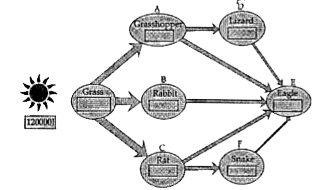
Based on the above information, indicate the amount of energy that an organism C may have received from an organism from the previous trophic level.View SolutionFood chains and the energy flow within an ecosystem provide an important understanding of contingencies and mutual dependencies of organisms. The given below flow chart depicts the energy flow within some members of a grassland ecosystem. The grass in the below ecosystem transducer 120,000 J of sunlight and fixes it into 12,000 J of energy. It is established that 90% of the energy of one trophic level is not passed to the next trophic level. Further assume that the energy transferred from one trophic level to the next is equally shared among the different organisms at that trophic level.
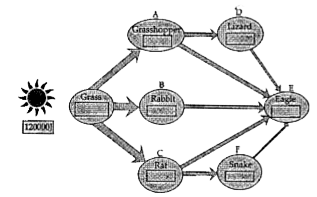
Tropic levels are formed by which of the following components?View Solution
Knowledge Check
- Question 1 - Select One
Amount of energy transferred from one trophic level to next is
A90%B10%C50%D1% - Question 2 - Select One
Amount of energy transfered from one trophic level to next is
A1.5%B10%C15%D20% - Question 3 - Select One
Energy transfer from one trophic level to other , in a food chain , is
A10%B20%C1%D2%
Food chains and the energy flow within an ecosystem provide an important understanding of contingencies and mutual dependencies of organisms. The given below flow chart depicts the energy flow within some members of a grassland ecosystem. The grass in the below ecosystem transducer 120,000 J of sunlight and fixes it into 12,000 J of energy. It is established that 90% of the energy of one trophic level is not passed to the next trophic level. Further assume that the energy transferred from one trophic level to the next is equally shared among the different organisms at that trophic level.
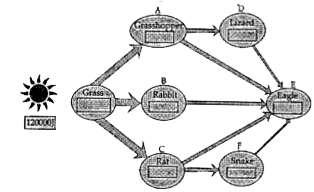
In the food web depicted above, identify the most energy efficient link for tertiary consumer.View SolutionFood chains and the energy flow within an ecosystem provide an important understanding of contingencies and mutual dependencies of organisms. The given below flow chart depicts the energy flow within some members of a grassland ecosystem. The grass in the below ecosystem transducer 120,000 J of sunlight and fixes it into 12,000 J of energy. It is established that 90% of the energy of one trophic level is not passed to the next trophic level. Further assume that the energy transferred from one trophic level to the next is equally shared among the different organisms at that trophic level.
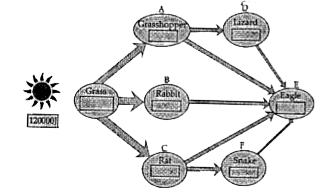
Which organism acts as both the secondary consumer and the tertiary consumer?View SolutionFood chains and the energy flow within an ecosystem provide an important understanding of contingencies and mutual dependencies of organisms. The given below flow chart depicts the energy flow within some members of a grassland ecosystem. The grass in the below ecosystem transducer 120,000 J of sunlight and fixes it into 12,000 J of energy. It is established that 90% of the energy of one trophic level is not passed to the next trophic level. Further assume that the energy transferred from one trophic level to the next is equally shared among the different organisms at that trophic level.
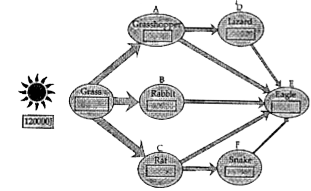
How many food chains are present in the food web depicted above?View SolutionEnergy and materials are not transferred from one trophic level to another.
View SolutionWhat percent of energy is transmitted from one trophic level to another in a food chain ?
View Solution

